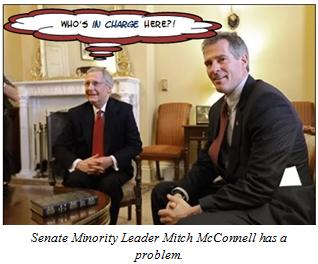One Republican Senator this year advised Americans for Limited Government staff that if Senate Republicans had just four more solid, conservative votes, that they would be in a position to stop anything in Barack Obama’s agenda.
For now, with only 41 Republicans in the Senate, New England Republican Senators Scott Brown, Olympia Snowe and Susan Collins wield considerable power that currently is enabling Obama to implement his agenda unhindered. On any given issue, the support of any of these three can green-light the success a piece of legislation.
Most recently, that has taken the form of enacting the Dodd-Frank financial takeover, where all three voted with Senate Democrats, and this week the $34 billion extension of unemployment welfare benefits, where Senators Snowe and Collins played the role of apostates.
The problem is further illustrated by South Carolina Republican Senator Lindsay Graham’s decision to vote for Obama’s nominee to the Supreme Court, Elena Kagan, effectively dashing any prospects for a filibuster against the controversial nominee. It even appears poised to prompt a primary challenge against Graham in 2014.
Even in the House, it is questionable whether the Republican caucus can stick together to vote unanimously against a $1 billion Indian Arts and Crafts amendment, mostly a make-work handout.
Basically, for all of the contrived complaints that Republicans are “obstructionists,” they really cannot stop anything — because they cannot keep their caucus together on any given issue. Too often, one or a few members will cross the aisle, giving Obama what he wants.
Part of the trouble with this approach is there is no reciprocity — nothing given in return. There are no positive Republican initiatives that are enacted as a result. No tax cuts, nor any debt reduction. Nothing like that at all. Instead, only the individual members who vote with the Democrats tend to benefit.
For example, in the case of the financial takeover debate throughout May, Massachusetts Senator Scott Brown traded his support for a carve-out. Specifically, Brown won exemptions to the Volcker Rule’s ban on proprietary trading for insurance companies and bank asset management in Massachusetts, which would have affected MassMutual.
Meanwhile, conservative Republicans, who make up the base of GOP voters, the people who want less government control over their lives, are those who are left stranded by these apostate votes. The effect is always negative: the incremental enactment of the Hard Left’s radical agenda.
So, last year it was the $862 billion “stimulus,” which included $145 billion to balance state budgets, with Senators Collins, Snowe, and then Republican Specter providing the necessary votes. In 2010, it was ObamaCare (with Specter to thank), the financial takeover (Brown, Snowe, and Collins), perpetual unemployment welfare extensions, and more attempted states bailouts.
For the remainder of the year, it is absolutely critical for Senate Republicans to stick together to help run out the clock — until reinforcements can arrive after November.
Consider White House Press Secretary Robert Gibbs talking openly about the Democrats losing control of the House of Representatives. As the White House becomes more and more concerned about losing power, they will be teeing up even more issues for passage leading up to and during the lame duck session of Congress later this year.
It will require party discipline for the remainder of the session to withstand this assault on America as Congress attempts to make laws capping carbon emissions and levying a national energy tax, establishing union card check, and handing out more unemployment welfare and states bailouts. Unfortunately, as noted above, unity is something the Republican Party has sorely lacked, especially in the Senate.
This is a key point. Contrasted with the unmatched party unity exhibited on the Democrat side of the aisle, which is enabling the implementation of an agenda that will last a generation, the Republican Party, especially in the Senate, has been dysfunctional. This is most exemplified by the party defections of Jim Jeffords (2001), Lincoln Chafee (2007), and most recently Arlen Specter (2009). While Jeffords and Specter’s defections were more conspicuous, in Chafee’s case, consistent threats to leave the Party drove policy decisions by Republican leadership to the lowest common denominator of trying to please him.
To avoid being held hostage again, Republicans would need to pick up more seats than there are potential apostates in the Party. With states like North Dakota, Indiana, Pennsylvania and others in play in 2010, it appears likely Republicans will pick up the reported four extra Senators needed to effectively kill key items on the Obama agenda.
What they do after that will determine whether, in 2011, Republicans govern, or are governed by these forces that do not use their positions for much more than political horse-trading. And ultimately, whether the American people lose what is left of their liberty to the implementation of Obama’s radical agenda.
Robert Romano is the Senior Editor of ALG News Bureau.


